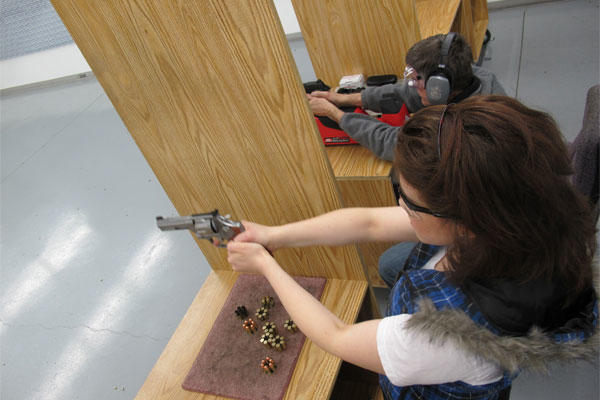FBI data on the number of active shootings thwarted by armed citizens appears to contradict an Air Force argument for authorizing off-duty airman to open-carry and conceal-carry weapons while on base.
In a reminder to commanders on Wednesday, Maj. Keith Quick, an Air Force Security Forces Integrated Defense action officer said national data analyzed by the Air Force showed that "many [active-shooter incidents] ended without police intervention because there was somebody there who had a concealed carry permit or somebody interdicted the active shooter."
But the data, which the Air Force said came from the FBI, states that only 5 of the 160 active-shooter incidents between 2000 and 2013 -- or 3.1 percent -- ended "after armed individuals who were not law enforcement personnel exchanged gunfire with the shooters."
The FBI report can be found here. An Air Force spokeswoman on Friday said the officer may have used other data, which officials are now trying to identify.
Across the country, there are discussions, especially after mass shootings, over whether having more civilians armed would prevent mass killings by deranged gunmen or terrorists.
National Rifle Association Chief Executive Officer Wayne LaPierre Jr. famously advocated for armed civilians by claiming that "the only thing that stops a bad guy with a gun, is a good guy with a gun."
The Air Force programs permitting base commanders to allow qualified airmen to carry weapons on base, on and off duty, were prompted by specific attacks on military installations, including one in July 2015 in Chattanooga, Tennessee, that left four Marines dead and a sailor wounded.
The gunman, a Kuwait-born naturalized U.S. citizen, was shot and killed by police.
Following that attack, Defense Secretary Ashton Carter directed the service secretaries to beef up armed security, including at facilities off base.
In December, Air Force Secretary Deborah James, referencing the Chattanooga attack as well those at Fort Hood, Texas, in 2009 and at the Washington Navy Yard in 2013. Army psychiatrist Maj. Nidal Hasan, who would admit to jihadist sympathies, killed 13 and wounded more than 30. At the Navy Yard, former Navy employee Aaron Alexis killed 12 people before turning the gun on himself.
"In the wake of [those attacks], we worked closely with DOD, the Joint Staff and other services to identify and provide effective and long-lasting force protection enhancements," James said.
The Air Force has three programs intended to enhance security through conceal-carry or open-carry by qualified airman. All require the approval of unit commanders and the authority of the base commander.
The programs are the Unit Marshal, the Security Forces Staff Arming and Law Enforcement Officer Safety Act, and the Law Enforcement Officer Safety Act -- the latter a federal statute established for civilian police but now available to service members through their commanders.
Some will allow for conceal carry and others for open carry. In all cases the airmen have to be properly trained and qualified with the weapon. Unit level commanders may request the armed credentialing for their airmen but the base commander is the approving authority.
"We take the safety of our service members, civilians and their families who support them seriously and continue to examine ways to make our installations and facilities safer."
--Bryant Jordan can be reached at bryant.jordan@military.com. Follow him on Twitter at @bryantjordan.



























